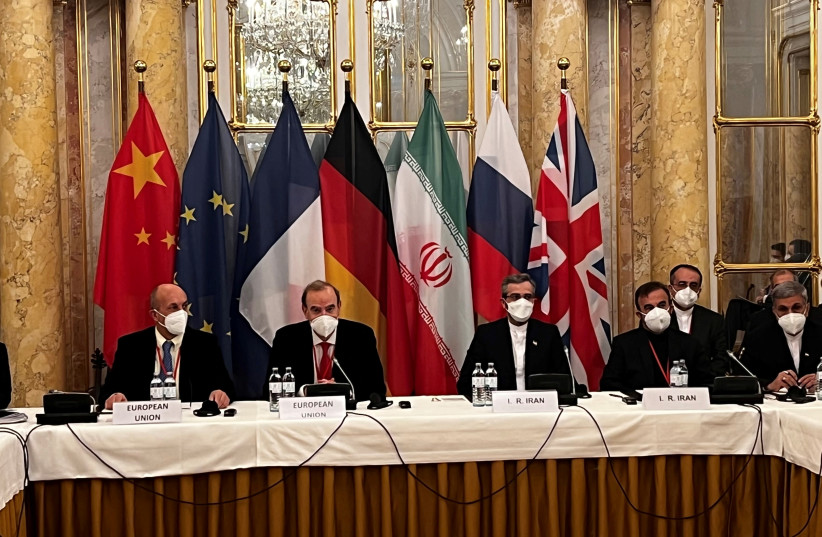Mossad head David Barnea and Defense Minister Benny Gantz took rearguard action in Washington to try to change the West’s approach to negotiations with Iran, as they were set to resume in Vienna on Thursday.
Both are “speaking with one message, same as the prime minister and foreign minister: Iran is susceptible to pressure; don’t lift sanctions and don’t go with a bad deal,” a senior Israeli diplomatic source said.
“We’re dealing with a huge motivation [of Western powers] to return to a deal, but the top echelon in Israel is having its say at full force. That’s very important,” the source said.
Gantz, who headed to Washington on Wednesday night, is expected to warn the Americans that Iran’s advances are bringing it to the nuclear threshold, and the way to attain a better deal is to put as much pressure as possible on the regime.
The defense minister will ask Washington to seek an agreement that also addresses Iran’s regional aggression and ballistic missiles.

State Department spokesperson Ned Price said alternatives to continuing negotiations with Iran will be a topic of discussion with Gantz.
“I fully expect regional security issues [to be discussed], including what we’re seeing with Iran and as we’ve said before the alternatives that we might be forced to pursue if Iran shows to us, shows to our allies and partners that it’s not willing to return in a substantive and genuine, constructive way to Vienna,” Price stated.
Barnea presented up-to-date intelligence to senior American figures this week pertaining to Iran’s nuclear advances and its international terror campaign.
Last week, Barnea said, “Iran will never have a nuclear weapon, not in the coming years, never. That is my commitment and the Mossad’s commitment.
“Clearly there is no need for uranium enriched to 60% for civilian purposes. There is no need for three sites with thousands of centrifuges unless the intention is to develop a nuclear weapon,” he said at an award ceremony for Mossad agents. “Our eyes are open, we are prepared, and we will do... all that is needed to remove that threat from the State of Israel and thwart it in every way.”
Iran and world powers are expected to return to negotiations to revive the 2015 Joint Comprehensive Plan of Action, which limited Tehran’s uranium enrichment until 2030, in exchange for the gradual lifting of sanctions. The US left the deal in 2018, and now seeks to return, along with a return to compliance by Iran.
Iran, however, has advanced its nuclear program far beyond the JCPOA’s 5% uranium enrichment restriction to 60% enrichment, which has no credible civilian use. The level of enrichment needed for a nuclear weapon is 90%.
Those advances have brought some in the Biden administration to seek an interim deal in which Tehran would freeze, but not scale back, its uranium enrichment, in exchange for the US lifting some sanctions set after 2018.
However, during last week’s seventh round of negotiations this year – and the first since June – the Islamic Republic started enriching uranium to 20% purity with advanced centrifuges at its Fordow site, which is buried inside a mountain.
That, and uncompromising Iranian draft agreements, brought the US and E3 – Britain, France and Germany – to stop talks last week, but they are set to continue on Thursday.
British Foreign Secretary Liz Truss said Thursday’s talks are “really the last chance for Iran to sign up” to return to the JCPOA.
“I strongly urge them to do that because we are determined to work with our allies to prevent Iran securing nuclear weapons,” she told the Chatham House think tank. “So they do need to sign up to the JCPOA agreement, it’s in their interests to do so.”
US Envoy for Iran Robert Malley, the lead US negotiator in Vienna, spoke with the deputy foreign ministers of Russia and China on Wednesday, and said they will “continue close trilateral coordination to achieve our common goal of mutual full JCPOA compliance based on the progress made over the first six rounds.”
The senior diplomatic source in Jerusalem expressed frustration at how soon the Western powers returned to the table, saying it shows their eagerness to reach an agreement fast.
“The Iranians respond to pressure,” the source said. “After they submitted two audacious drafts and were told they’re crazy, Iran folded and wanted to return fast.... The Iranians called [the Western states] and they came.”
“The rial has collapsed and there are protests around Iran. The West has all the cards that allow it to be tough; they should play them,” the source added.
